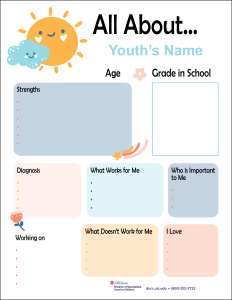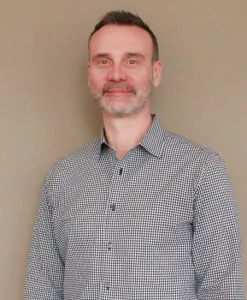Annual Illinois Statewide Transition Conference Maps Out Routes to Adulthood
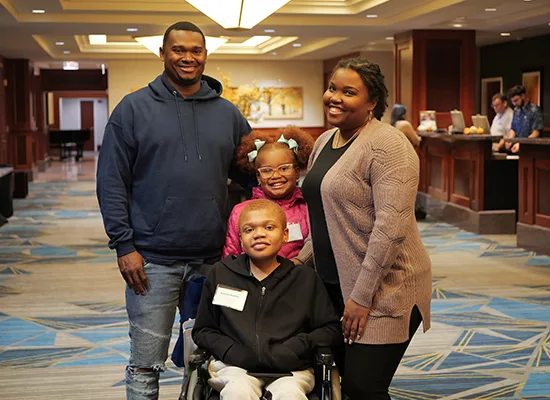
The annual Illinois Statewide Transition Conference provides valuable opportunities and resources to help youth and young adults with disabilities navigate the transition to adulthood.
Turning 18 is a major milestone. For Brenton Braxton and his family, they approached it with a mix of excitement and many questions about the future.
What benefits can Brenton qualify for as an adult? What should they know about guardianship and power of attorney?
Brenton has Duchenne muscular dystrophy, a genetic disorder that causes his muscles to weaken over time.
“When Brenton was first diagnosed when he was 7, these things that are being presented to us now – at that time, we had no idea that we’d be able to be at this place. So, that’s why my word I keep using is a sense of excitement because… Brenton’s still thriving,” his mom, Veneise, said.
Brenton is now a senior in high school with a strong interest in sports and a desire to go to college and “live life to the fullest.”
To help Brenton and his family prepare for what’s next, their Division of Specialized Care for Children (DSCC) Care Coordinator recommended they attend the Illinois Statewide Transition Conference.
The annual event provides valuable resources and information to help youth with disabilities and their families navigate the transition to adulthood.
“One of the major reasons why we wanted to attend this conference is that we wanted to get in the room with the resources. We wanted to get to the people, talk to the people, engage with the people that can say, ‘Hey, here’s what your child qualifies for. Hey, try this program for him, do this, go down this avenue,’” Veneise said.
“You just really want to have your feet grounded in knowing what’s getting ready to happen.”
The Braxtons were among nearly 450 people who attended the 19th Illinois Statewide Transition Conference, titled “Stepping Stones of Transition,” on Nov 7-8, 2024, at the Crowne Plaza Hotel and Convention Center in Springfield.
The transition conference brings together youth with disabilities, parents, caregivers, vocational professionals, healthcare professionals, educators and more.
Youth with disabilities and their families can network and find answers to common questions about the transition to adulthood, including:
- What happens after I leave high school?
- How do I sort through the maze of resources?
- What steps can I take now to prepare for upcoming changes?
- What skills are important for me to develop?
“Here we all are in one space.”
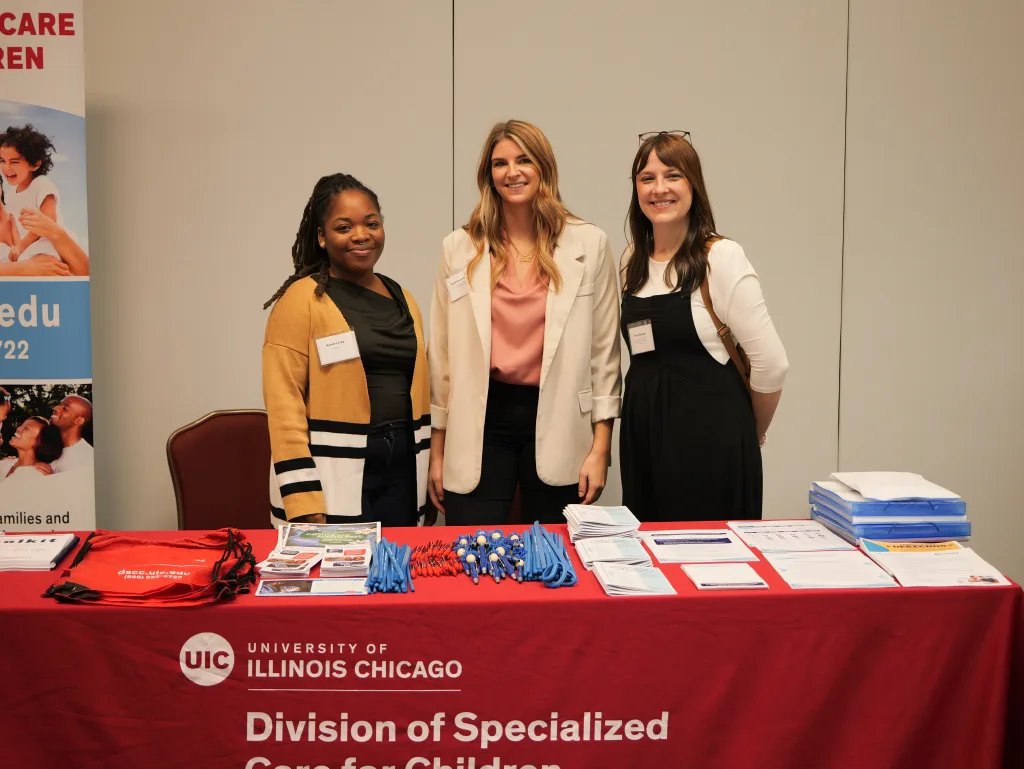
DSCC Home Care Family Outreach Associate Erica Stearns describes the annual conference as “a dream come true.”
Erica is the parent of two children enrolled with DSCC. Erica also has lived experience as an individual with disabilities.
“I was talking to another adult with disabilities before this interview, and it dawned on me, I didn’t grow up having this,” she said.
“To have an event where everyone is coming together for a similar purpose related to our children and their disabilities is incredibly meaningful, and it’s unique in that here we all are in one space.”
Erica highlighted the importance of ensuring youth and young adults have access to the information and resources they need as they transition to adulthood.
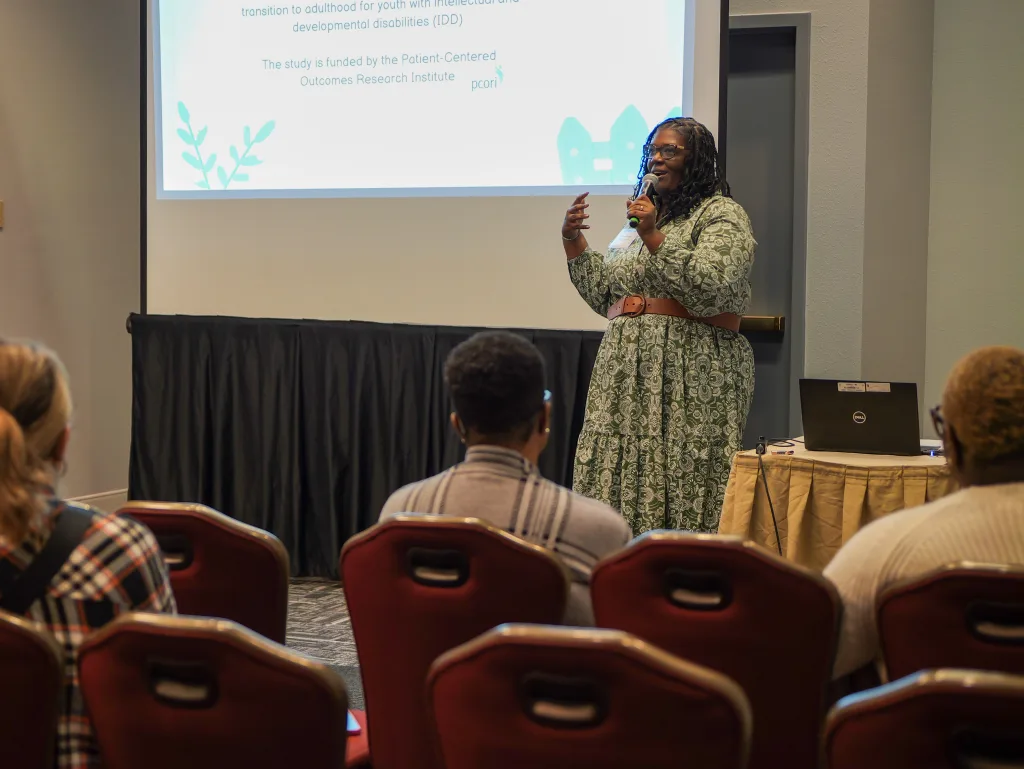
“It is abundantly clear that while we know that there are certain steps and certain paths that individuals with disabilities can take as they navigate their entry into adulthood, the information to prepare both their families and themselves for that is very challenging to find,” she said.
“I think most families feel empowered with knowledge. And I think that’s what this conference provides families is information, knowledge, tools and resources.”
DSCC helps sponsor the conference and serves on its steering committee. DSCC also provides financial support to help participant families attend the conference.
Claire Cook is DSCC’s Title V Transition Specialist and co-chair of the Transition Conference’s Steering Committee.
“Several families came back from last year,” said Claire. “We had about 20 or so individual families from DSCC, five of which were primarily Spanish speaking and several of our transition-age youth.”
“A lot of opportunities, a lot of information.”
Jani, 14, attended the conference with his mom, Aimee, and sister, Grace.
Jani has spinal muscular atrophy (SMA). He first enrolled with DSCC when he was diagnosed with SMA, close to 12 years ago.
Jani described the conference as a positive experience with valuable information. He and his family gained resources, discovered new opportunities and made connections.
“We had a very nice family that was sitting by us (at lunch), whose son had a similar disability. It was just nice to talk to them and hear their story,” Jani said.
When asked if he would recommend the conference to other young adults, he said, “You should definitely come because it has a lot of opportunities, a lot of information. It’s just good to come to understand what’s going to happen, what they want to do later in life.”
After high school, Jani plans to go to college and become a teacher.
“I want her to be strong, and I want her to be confident.”
TaLeah, 17, attended the conference with her mom, Tamara. TaLeah first enrolled with DSCC 15 years ago, when she was diagnosed with hearing loss.
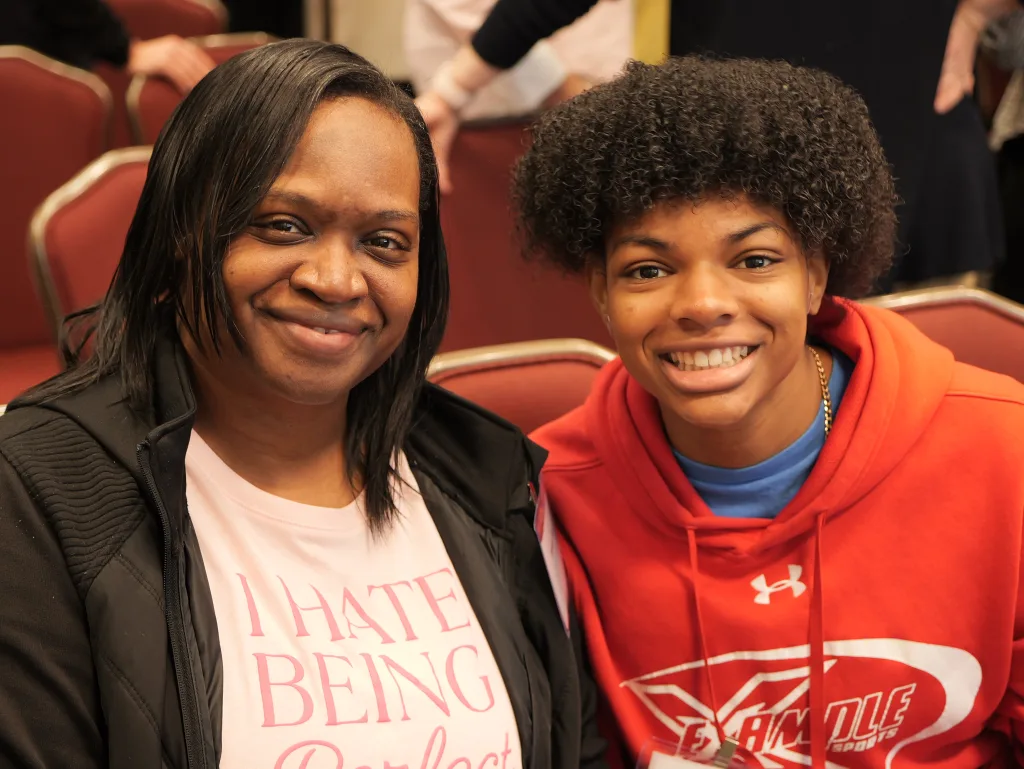
She is an accomplished basketball player who plans to go to college, play basketball and be successful.
“I want her to be strong, and I want her to be confident,” said Tamara.
“I want her to continue to advocate for herself and others. And I think she’s doing a good job thus far.”
Tamara said she is trying to give her daughter the best tools and equip her the best way she knows how.
“All this information is very helpful and hopefully it’ll help build her up.”
Brenton Braxton said the resources and knowledge his family gained at the conference will help him achieve his goals.
“I think some things from here that I learned is that not only I’ll still have my independence, but I can also use my parents to help me in my journey and to living it to the fullest and doing all the things I want to do,” he said.
On turning 18, he said, “It’s a big step, but I feel like with the support from my family and people around me, it’ll be good.”
Save the Date for the 2025 Transition Conference
The 2025 Illinois Statewide Transition Conference will take place Oct. 30-31 at the Crowne Plaza Hotel and Convention Center in Springfield.
To learn more about how to support youth with special healthcare needs during the transition to adulthood, contact DSCC at (800) 322-3722 or dscc@uic.edu.
For more information about the Transition Conference, visit www.illinoistransitionconference.org/.
Check out our Facebook page to see a photo album with more photos from the 2024 Transition Conference.
DSCC Families, We Want Your Feedback!
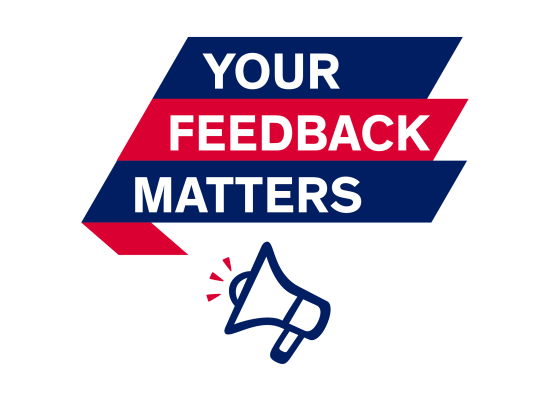
Our annual family survey is an easy way to share your input and help improve our services.
Attention participant families, be sure to watch your mail or email!
On Feb. 10, all Division of Specialized Care for Children (DSCC) participants will receive our annual family survey.
This survey asks how well our team members support your family and meet your needs. It also asks about:
- Your contact preferences
- How and when you’d like to meet with our team
- How well our staff communicates with you
You will receive this survey by email or mail, based on your preferences. If you respond, you could win one of five $50 Amazon gift cards.*
Your responses will help us strengthen your services. They also guide updates to our DSCC policies and procedures that affect your family.
Our surveys are optional, but we strongly encourage you to share your experiences. We want to ensure we’re doing all we can to help you meet your family’s needs and achieve your goals.
* Please note: Foreign national nonresident aliens are not eligible for the gift card participation prize.
How Your Feedback Makes a Difference
Your ideas and feedback help improve our services to families like yours. We used family input from last year’s survey to:
- Train our care coordination teams to better understand the family perspective and tailor services to your unique needs and wants.
- Educate families about the benefits of our DSCC Family Portal to easily communicate and share information with your care coordination team.
- Launch NurseNet, a new online tool to help families connect with available in-home nurses.
- Offer free webinars on important health insurance topics affecting families.
- Improve our language access to better support our families’ diverse backgrounds.
- Reorganize our Chicago offices to better serve the Chicago community.
Please be on the lookout for our annual survey on Feb. 10.
If you have questions or need more information, please contact your Care Coordinator.
We appreciate your partnership and look forward to hearing from you!
Mokena Care Coordinator Earns DSCC’s Award of Merit

DSCC honors Meeka Hudson for her dedication to supporting Illinois children and youth with special healthcare needs and their families
Care Coordinator Meeka Hudson is the 2024 recipient of the University of Illinois Chicago’s Division of Specialized Care for Children (DSCC) Award of Merit.
The award recognizes exceptional employees for outstanding dedication and service to Illinois children with special healthcare needs and their families.
Meeka is a Care Coordinator in the Mokena Regional Office. She joined the Core Program team in 2018 and has played an invaluable role in empowering families ever since.
“Meeka is an exceptional Care Coordinator with a passion for helping her participant families navigate difficult situations and finding ways to reduce stress in their lives,” DSCC Executive Director Thomas F. Jerkovitz said.
“Her teammates praise her dedication, knowledge of resources and willingness to help. Meeka has also been instrumental in developing valuable education and networking opportunities for families based at the Mokena office.”
Meeka’s colleagues in the Mokena office nominated her for the award, noting her positive influence, expertise, compassion and creativity.
“Meeka’s dedication to her role is evident in everything she does,” Mokena Assistant Regional Manager Tami L. Peleckis said. “She is always ready to lend a hand, provide guidance, and share her expertise with her colleagues. Her positive attitude and willingness to go the extra mile make her an indispensable asset to our team.”
Program Coordinator Assistant Leslie Leske-Ely praised Meeka’s ability to break down information into manageable steps and empower families to take charge of their situations.

“She provides positive and innovating contributions to our office. Her ideas help in improving our office morale and family engagement,” Bilingual Care Coordinator Ana Lule said. “Meeka consistently goes above and beyond to ensure that families receive the support and resources they need. She approaches every case with empathy and a genuine desire to make a positive impact.”
Mokena Regional Manager Deanna Deleshe has worked with Meeka since she started at DSCC. When Meeka’s participant families wanted a space to network with other families in their same situation, Meeka saw a need and shared an idea with Deanna.
“Meeka was the inspiration behind our pilot of the Mokena Family Networking and Education Group called the Mokena Connection,” Deanna said. “Meeka also, along with other team members, was the inspiration behind all of our in-person office events (for participant families). We do our Winter Wonderland, our Spring Fling, our Summer Extravaganza and our Trunk or Treat.”
Meeka said she is “deeply honored and incredibly grateful to receive the 2024 Award of Merit.”
“This recognition is not just a personal achievement, but a reflection of the support, encouragement and inspiration I’ve received from the Mokena Regional Office Team,” Meeka continued. “I am truly fortunate to work alongside such talented, dedicated individuals.”
Meeka thanked DSCC’s leadership and added a special thank you to her managers Deanna and Tami, whose belief in her has made all the difference.
“This award is a testament to the teamwork, hard work, and passion that we put into everything we do,” she said.
Learn more about Meeka and her exceptional service to families in this video below:
DSCC staff nominated a total of 13 of their colleagues for this year’s Merit Award. As the winner, Meeka will receive a Merit Award memento, a $2,500 award and recognition from the Executive Director.
Congratulations to the rest of our 2024 DSCC Award of Merit Nominees:
- Daniel “Dan” Beagles, Training and Development Specialist, Mokena Regional Office (RO)
- Becky Helmink, Program Coordinator Assistant, Olney RO
- Andrea Hoskinson, Assistant Director Operations-Finance, Accounting and Procurement, Central Administrative Office (CAO)
- Amanda Kaufman, Care Coordinator, Home Care (HC) Region 3
- Cristina Lazala, Bilingual Program Coordinator Assistant, HC Region 2
- Cathleen “Cathy” Morrissey, Program Coordinator Assistant, Mokena RO
- Patricia Perez, Assistant Director of Operations-Research and Practice Initiatives, Chicago RO
- Yariela “Yari” Ramirez Beccue, Program Services Specialist, CAO
- Mary Ratermann, HC enrollment Specialist, St. Clair RO
- Adell Scott, Manager of HC Quality Improvement, St. Clair RO
- Paige Town, Assistant Regional Manager, Rockford RO
- Imani Wornum, Care Coordinator, HC Region 5
Learn more about all of the 2024 nominees in this recap video of the Award of Merit luncheon on Oct. 29 in Springfield:
DSCC Earns Case Management Accreditation
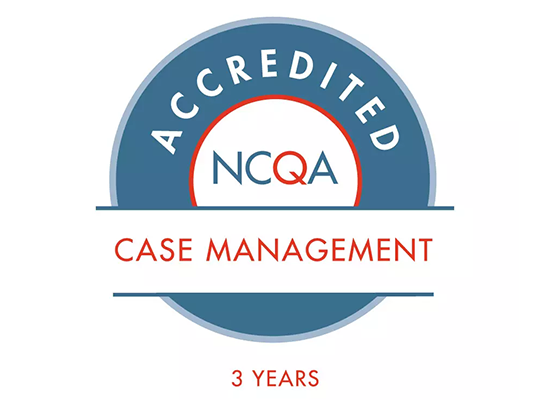
The prestigious achievement recognizes our commitment to providing the highest quality service and support to our participant families.
We are proud to share a significant milestone for our University of Illinois Chicago’s Division of Specialized Care for Children (DSCC) team.
DSCC has earned Case Management Accreditation from the National Committee for Quality Assurance (NCQA). This achievement recognizes our commitment to providing exceptional care coordination and related support to our participant families.
NCQA accreditation is widely known as a symbol of quality and shows an organization’s dedication to meeting high performance measures and continuous improvement.
“We are thrilled to receive NCQA Case Management Accreditation, which highlights the strength and person-centered focus of our care coordination services,” said DSCC Executive Director Thomas F. Jerkovitz.
“This achievement reflects the great work of our entire DSCC team to improve operations and strengthen how we partner, help and connect with families throughout the state. We hope our participant families can feel confident and empowered, knowing they have a strong support system focused on improving their quality of life.”
DSCC provides care coordination to Illinois children and youth with special healthcare needs and their families through several programs.
We tailor our care coordination to each family’s unique needs and goals. We partner with them to develop a care plan focused on a child’s medial, social, behavioral, educational and financial needs.
Our care coordination can include finding specialized medical care, helping families understand their child’s diagnosis and medical treatment plan, explaining insurance benefits and attending school meetings.
In 2021, DSCC’s leadership set a strategic goal to work toward NCQA accreditation. Our team members have worked for more than three years to achieve this major recognition.
NCQA purposely sets its accreditation standards high to encourage organizations to continuously enhance their quality. The standards aim to help organizations achieve the highest level of performance possible and create an environment of continuous improvement.
The NCQA Case Management Accreditation Program reviewed our care coordination and entire organization against the following standards:
- Program Description: The organization uses up-to-date evidence-based information to develop its case management program and regularly updates the program with relevant findings and information.
- Patient Identification and Assessment: The organization systematically identifies patients who qualify for its programs.
- Care Planning: The organization coordinates services for patients through the development of individualized care plans.
- Care Monitoring: The organization has systems in place to support case management activities and monitors individualized care plans.
- Care Transitions: The organization has a process to manage care transitions, identify problems that could cause care transitions and prevent unplanned transitions, when possible.
- Measurement and Quality Improvement: At least annually, the organization measures patient satisfaction, program effectiveness and participation rates.
- Staffing, Training and Verification: The organization defines staffing needs, provides staff with ongoing training and oversight and verifies healthcare staff credentials.
- Rights and Responsibilities: The organization communicates its commitment to the rights of patients and its expectations of patients’ responsibilities.
“Case Management Accreditation moves us closer to measuring quality across population health management initiatives,” said NCQA President Margaret E. O’Kane. “Not only does it add value to existing quality improvement efforts; it also demonstrates an organization’s commitment to the highest degree of improving the quality of their patients’ care.”
A big congratulations and thank you to everyone who helped us reach this milestone!
NCQA is a private, nonprofit organization dedicated to improving health care quality. NCQA accredits and certifies a wide range of health care organizations. It also recognizes clinicians and practices in key areas of performance. NCQA’s Healthcare Effectiveness Data and Information Set (HEDIS®) is the most widely used performance measurement tool in health care. NCQA’s website (ncqa.org) contains information to help consumers, employers and others make more-informed health care choices. NCQA can be found online at ncqa.org, on Twitter @ncqa, on Facebook at facebook.com/NCQA.org/ and on LinkedIn at linkedin.com/company/ncqa.
New Youth Advisory Council for Teens and Young Adults With Special Healthcare Needs
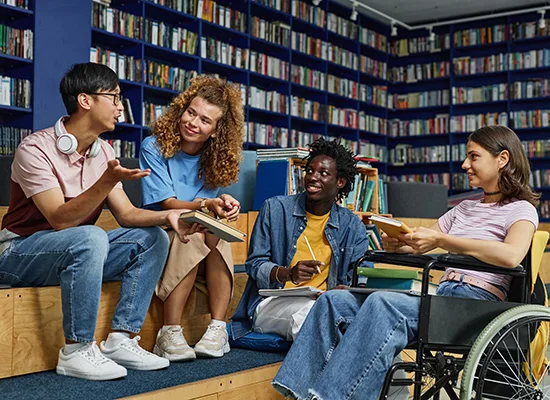
An opportunity for youth to help improve transition support and make a difference!
Youth with special healthcare needs should have a big role in shaping their future and helping improve support for others.
We want to hear from teens and young adults about what’s important and helpful to them as they plan for the future. Our new Youth Advisory Council is a great opportunity for them to share their input and make a difference.
The Youth Advisory Council (YAC) is a diverse, youth-driven group that aims to develop more youth-focused ways to help individuals and families with transition planning, resources and services.
The YAC’s goal is to support positive outcomes in adulthood for all Illinois youth with special healthcare needs in the areas of:
- Employment
- Health care
- Independence
- Quality of life
The YAC’s role is to:
- Bring a different and personal perspective on issues important to youth.
- Partner with the Division of Specialized Care for Children (DSCC) to help develop more youth-focused methods to enhance care coordination.
- Develop strategies to improve communication between youth/young adults and older adults.
Members participate in four virtual meetings per year.
Who is Eligible to Join the YAC?
The YAC is open to youth with special healthcare needs who are:
- Ages 15 to 24
- Living in Illinois
- Planning for the transition to adulthood in the areas of education, health care, employment and home and community-based support
Youth do not have to be a DSCC participant to join the council.
How to Join and Learn More
Members must complete an online application to join. (The application is also available in Spanish.)
Visit our Youth Advisory Council page for more information and answers to frequently asked questions.
You can also see the YAC flyer for more details:
If you have questions, please contact Claire Cook, DSCC’s Title V Program Transition Specialist, at clairer3@uic.edu or (800) 322-3722, ext. 21812.
Inclusive Summer Camp Programs for All Ages

Our list of camps and activities all over Illinois can help you find the right fit for your child
Summer and the long break from school are right around the corner!
The good news is there are a variety of programs throughout the state to help keep your children engaged and learning.
We’ve gathered a list of day and overnight camps as well as virtual programs for youth of all ages with disabilities and special healthcare needs.
Does your child want to make new friends? Develop new skills? Meet others with their same condition or become more independent?
Our 2024 summer camp list can help you find the right fit.
There are several ways to search the camp opportunities on our website:
- Use the search box and filter option on our Events page to search for camps and other related keywords and locations
- View our full 2024 summer camp list
- Use our Events Calendar view to see summer camps listed by date
These camps are accessible and inclusive for a variety of ages and needs, including many of our program’s eligible medical conditions.
Please note that program deadlines vary, and some camps fill up quickly.
Know of a good summer camp opportunity to add to our list?
Send us the details at dscc@uic.edu. We’ll continue to update our list of camps and activities, so please check back often!
DSCC Families, It’s Time to Share Your Input!

Our annual family survey is an easy way to share your feedback and make a direct impact.
Our participant families are important to us, and your feedback matters.
On Feb. 15, all Division of Specialized Care for Children (DSCC) participants will receive our annual family survey.
This survey asks how well our team members support your family and meet your needs. It also asks about:
- Your contact preferences
- How and when you’d like to meet with our team
- How well our staff communicates with you
You will receive this survey either by email or mail, based on your preferences. If you respond, you will have a chance to win a $50 Visa gift card.*
Your responses will help us strengthen your services. They also guide updates to our DSCC policies and procedures that affect your family.
Our surveys are optional, but we strongly encourage you to share your experiences. We want to ensure we’re doing all we can to help you meet your family’s needs and achieve your goals.
* Please note: Foreign national nonresident aliens are not eligible for the gift card participation prize.
How Your Feedback Makes a Difference
Listening to our participant families is a priority. Your ideas and concerns have helped strengthen our services and guide improvement projects.
Here’s an overview of how the 2023 survey input and overall family feedback made a difference at DSCC:
- Our authorizations are now easier to fill out and keep up to date. We updated the form authorizing us to share information with multiple providers, meaning only one signature on one form.
- Our online resource library is now searchable. Families shared their need for more resources. In response, we updated our online Resource Directory and Events page to add search features. This improvement should help all Illinois families of children and youth with special healthcare needs find and share resources more easily.
- We resumed face-to-face visits. Our care coordination teams resumed face-to-face visits with families following the end of the public health emergency on May 11, 2023. Meeting in person should further improve our connection and engagement with families.
- We created a new Family Portal. In October 2023, DSCC introduced a new Family Portal to better connect families with their care teams. The portal gives participant families one place to communicate with their care coordination teams, sign documents and access information.
- We created “All About Me” Pages to help others get to know your child. DSCC developed “All About Me” Pages so families can highlight their child’s strengths, medical needs and more. Families can personalize the templates to best fit their child’s personality. You can share these templates with medical providers, schools, other caregivers and so on. These pages should make it easier to share what works best for your child, what they like and dislike, and their medical needs. These templates are available on our website’s “All About Me” Pages section.
- We’ve partnered to improve nursing availability throughout the state. Nursing agencies that work with DSCC can now receive a license to work across the state. We partnered with the Illinois Department of Public Health to make this change. The new license process offers more opportunities for nursing coverage for families of children and adults with complex medical needs. DSCC is also developing NurseNet. This interactive website will allow families looking for nursing to connect with nursing agencies.
Please be on the lookout for our annual survey on Feb. 15.
If you have questions or need more information, please contact your Care Coordinator.
We appreciate your partnership and look forward to hearing from you!
Introducing “All About Me” Pages to Highlight Your Child’s Strengths, Needs and More

We’ve created free templates you can personalize to help doctors, schools and others get to know your child
It takes a village to care for children and youth with special healthcare needs. Parents and caregivers must partner with many different team members — specialists, nurses, therapists, educators and so on — to help their children reach their full potential.
Ensuring everyone understands your child and their unique needs can be exhausting. We want to help make it easier to share your child’s strengths, wants, goals and more.
We’ve created “All About Me” Pages that you can personalize to help anyone get to know your child. These free templates highlight what works best for your child, what they like and dislike and who they are as a person.
There are a variety of designs to choose from to help you capture your child’s personality and what makes them unique.
Visit the new “All About Me” Pages section of our website to see the templates and learn how to customize them for your child.
Our “All About Me” Page templates are available for anyone to download and customize.
If you are a Division of Specialized Care for Children (DSCC) participant and need help using the templates, please contact your Care Coordinator.
These pages are a result of feedback from our annual family surveys and our Family Advisory Council meetings.
We hope these pages can be helpful conversation starters with new doctors, nurses, teachers and other caregivers for your child.
Home Care Region 2 Care Coordinator Earns DSCC’s Award of Merit
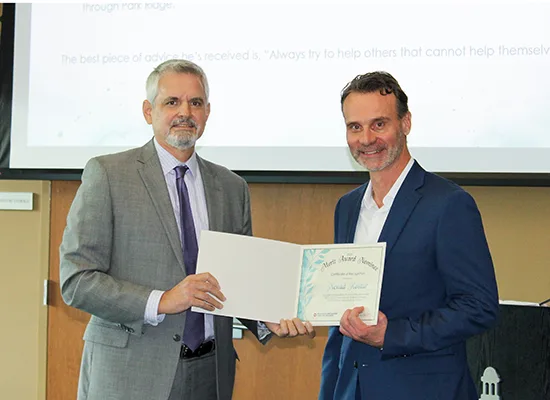
DSCC honors Ned Kostur for outstanding service to Illinois children and youth with special healthcare needs and their families
Care Coordinator Ned Kostur is the 2023 recipient of the University of Illinois Chicago’s Division of Specialized Care for Children (DSCC) Merit Award.
The award recognizes exceptional employees for outstanding dedication and service to Illinois children and youth with special healthcare needs.
“Ned is an outstanding Care Coordinator. He is a trusted mentor to his teammates and a caring and dedicated partner to the families he serves, helping meet their needs and improve the quality of their lives,” DSCC Executive Director Thomas F. Jerkovitz said.
Ned is based in our Lombard Regional Office and works for DSCC’s Home Care Region 2. As a Care Coordinator in the Home Care Program, he helps families of children and youth who need in-home nursing to safely live at home.
Many of the DSCC participants Ned works with are on the Home and Community-Based Services Waiver for Those Who are Medically Fragile Technology Dependent (commonly called the MFTD waiver). These children and youth have more complex medical needs that require a higher level of care.
Ned helps educate their families about the services and benefits of the MFTD waiver and other state programs that can help meet their needs. He also guides families through the process of modifying their homes to support their child’s medical care and equipment.
“I meet with families, which I enjoy very much. It’s just a rewarding experience to get a piece of equipment or to finally find that right nursing fit for that family and just to see the smile on the family’s face as we’re aiding them in their journey in helping their child,” Ned said. “It’s just a great organization to work for.”
Ned began his journey with DSCC in 2003. Over the last two decades, he has worked in both the Core and Home Care programs.
Ned is a “go-to” for his colleagues who describe him as caring, compassionate, considerate, and hard-working. They also love how his passion for serving our participant families shines through in all his actions.
“Ned exemplifies what great care coordination looks like and its positive impact on the families we serve,” said Terri-lynn Jones Wood, Assistant Director of Home Care Operations for Regions 2, 4 and 6.
“He has a true desire to bring families a sense of relief and understanding that they have someone on their side, someone they can trust and rely on,” Home Care Region 2 Regional Manager Mariangely Spilotro-Marquez added.
“He takes great pride in his work and ensuring that families understand Home Care, the services provided, what his role is and how he can assist them.”
Ned draws on his experience in clinical psychology, biology, treatment and discharge planning, quality assurance, teaching and more to help others. His Lombard teammates appreciate his wealth of knowledge about DSCC processes and resources, sense of humor and willingness to help in any situation.
“He has shown me what it means to be dedicated, empathetic and professional,” Program Coordinator Assistant Kimberley Firkins said. “Ned’s the perfect example of what it means to partner, help, and connect, not only with our families and providers but also within the organization, with his teams, and his co-workers.”
Learn more about Ned and his exceptional service to families in this video below:
DSCC staff nominated a total of five of their colleagues for this year’s Merit Award. As the winner, Ned receives a Merit Award memento, a $2,500 award and recognition from the Executive Director.
The other 2023 nominees are:
- Elizabeth “Liz” Bailey, Home Care Enrollment Manager, Lombard Regional Office
- Lisa Garbe, Assistant Regional Manager. Marion and Olney Regional Offices
- Mayra Rubio, Bilingual Care Coordinator, Mokena Regional Office
- Amanda Simhauser, Communications Manager, Central Administrative Office in Springfield
A big congratulations to Ned and all the 2023 nominees! We are grateful for your service and commitment to Illinois families!
DSCC Quality Specialist Honored for Service to Families in Crisis
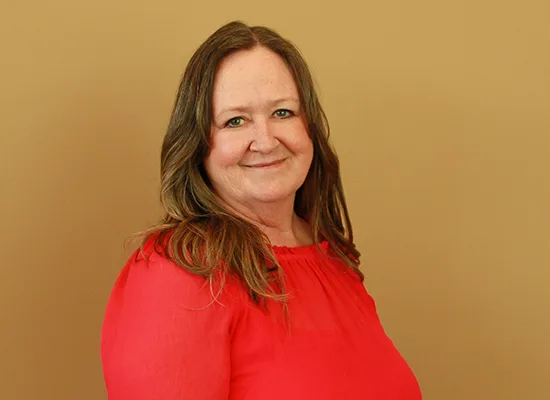
CountyCare awarded Tess Rhodes its Certificate of Excellence for her commitment and dedication
Tess Rhodes is a registered nurse on our Quality Improvement Team. She collaborates with her Division of Specialized Care for Children (DSCC) teammates and partner organizations across Illinois to make sure children in crisis have the right support.
A managed care health plan recently honored Tess for these efforts to protect the safety of children and families.
CountyCare’s Health, Safety and Welfare Team awarded Tess its Certificate of Excellence. The certificate recognizes her “tremendous commitment and dedication” to keeping County Care participants safe and meeting their families’ needs.
Tess said she couldn’t do this important work without DSCC’s care coordination teams and our partners in the community.
DSCC has a contract with CountyCare to provide care coordination to the children and youth with special healthcare needs in its Medicaid managed care health plan.
As a Core/Connect Care Quality Improvement Specialist, Tess helps DSCC’s care coordination teams when a participant enrolled in CountyCare has a critical incident.
Critical incidents are events or situations that create a significant risk of substantial or serious harm to a participant’s physical or mental health, safety or well-being. They can include:
- Abuse or neglect
- Harassment or bullying
- Death of a family member
- Significant injuries
- Medication or treatment errors
- Threat of self-harm
DSCC works with CountyCare to report these incidents and make sure our teams respond to reduce any risks for our participants and help them get the right resources and services they need.
When DSCC team members learn of a critical incident, they must report it to CountyCare within 24 hours of notification.
Tess says it’s important to first ensure that our child/youth is safe and that their family receives the right support for their situation.
Tess and the DSCC care coordination teams work alongside CountyCare staff, the child’s medical team and others to provide access to services and resources.
The DSCC Care Coordinator checks in with the family bi-weekly after a crucial incident to help and monitor the outcome. Tess assists in the process by guiding the participant’s Care Coordinator and providing more resources and materials for education.
Once CountyCare closes a critical incident, Tess continues to monitor the situation and provides final updates at the 30-, 60- and 90-day marks. She also coordinates meetings for all care team members to discuss the incident and develop a plan of support.
“This requires very detailed organizational skills, and Tess never misses an update or chance to help,” her supervisor, Quality Improvement Manager Brandon Bartels, said.
Brandon praised Tess’ “exceptional” communication with CountyCare and her collaboration to keep participants’ and families’ needs at the forefront.
“Tess has received accolades by email from their team multiple times, so this Certificate of Excellence proves not only have they valued her efforts in the past but her continued support for our participants, Care Coordinators, and relationship with CountyCare is truly making an impact,” he said.
Congratulations, Tess! We are grateful for your compassion, teamwork and commitment to children and families!



